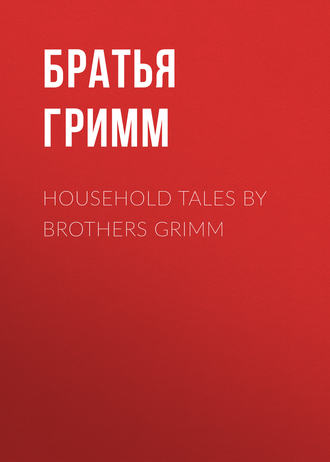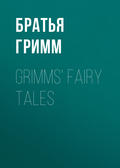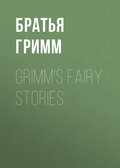
Братья Гримм
Household Tales by Brothers Grimm
174 The Owl
Two or three hundred years ago, when people were far from being so crafty and cunning as they are now-a-day, an extraordinary event took place in a little town. By some mischance one of the great owls, called horned owls, had come from the neighboring woods into the barn of one of the townsfolk in the night-time, and when day broke did not dare to venture forth again from her retreat, for fear of the other birds, which raised a terrible outcry whenever she appeared. In the morning when the man-servant went into the barn to fetch some straw, he was so mightily alarmed at the sight of the owl sitting there in a corner, that he ran away and announced to his master that a monster, the like of which he had never set eyes on in his life, and which could devour a man without the slightest difficulty, was sitting in the barn, rolling its eyes about in its head. "I know you already," said the master, "you have courage enough to chase a blackbird about the fields, but when you see a dead hen lying, you have to get a stick before you go near it. I must go and see for myself what kind of a monster it is," added the master, and went quite boldly into the granary and looked round him. When, however, he saw the strange grim creature with his own eyes, he was no less terrified than the servant had been. With two bounds he sprang out, ran to his neighbours, and begged them imploringly to lend him assistance against an unknown and dangerous beast, or else the whole town might be in danger if it were to break loose out of the barn, where it was shut up. A great noise and clamour arose in all the streets, the townsmen came armed with spears, hay-forks, scythes, and axes, as if they were going out against an enemy; finally, the senators appeared with the burgomaster at their head. When they had drawn up in the market-place, they marched to the barn, and surrounded it on all sides. Thereupon one of the most courageous of them stepped forth and entered with his spear lowered, but came running out immediately afterwards with a shriek and as pale as death, and could not utter a single word. Yet two others ventured in, but they fared no better. At last one stepped forth; a great strong man who was famous for his warlike deeds, and said, "You will not drive away the monster by merely looking at him; we must be in earnest here, but I see that you have all tuned into women, and not one of you dares to encounter the animal." He ordered them to give him some armour, had a sword and spear brought, and armed himself. All praised his courage, though many feared for his life. The two barn-doors were opened, and they saw the owl, which in the meantime had perched herself on the middle of a great cross-beam. He had a ladder brought, and when he raised it, and made ready to climb up, they all cried out to him that he was to bear himself bravely, and commended him to St. George, who slew the dragon. When he had just got to the top, and the owl perceived that he had designs on her, and was also bewildered by the crowd and the shouting, and knew not how to escape, she rolled her eyes, ruffled her feathers, flapped her wings, snapped her beak, and cried, "Tuwhit, tuwhoo," in a harsh voice. "Strike home! strike home!" screamed the crowd outside to the valiant hero. "Any one who was standing where I am standing," answered he, "would not cry, strike home!" He certainly did plant his foot one rung higher on the ladder, but then he began to tremble, and half-fainting, went back again.
And now there was no one left who dared to put himself in such danger. "The monster," said they, "has poisoned and mortally wounded the very strongest man among us, by snapping at him and just breathing on him! Are we, too, to risk our lives?" They took counsel as to what they ought to do to prevent the whole town being destroyed. For a long time everything seemed to be of no use, but at length the burgomaster found an expedient. "My opinion," said he, "is that we ought, out of the common purse, to pay for this barn, and whatsoever corn, straw, or hay it contains, and thus indemnify the owner, and then burn down the whole building, and the terrible beast with it. Thus no one will have to endanger his life. This is no time for thinking of expense, and niggardliness would be ill applied." All agreed with him. So they set fire to the barn at all four corners, and with it the owl was miserably burnt. Let any one who will not believe it, go thither and inquire for himself.
175 The Moon
In days gone by there was a land where the nights were always dark, and the sky spread over it like a black cloth, for there the moon never rose, and no star shone in the obscurity. At the creation of the world, the light at night had been sufficient. Three young fellows once went out of this country on a travelling expedition, and arrived in another kingdom, where, in the evening when the sun had disappeared behind the mountains, a shining globe was placed on an oak-tree, which shed a soft light far and wide. By means of this, everything could very well be seen and distinguished, even though it was not so brilliant as the sun. The travellers stopped and asked a countryman who was driving past with his cart, what kind of a light that was. "That is the moon," answered he; "our mayor bought it for three thalers, and fastened it to the oak-tree. He has to pour oil into it daily, and to keep it clean, so that it may always burn clearly. He receives a thaler a week from us for doing it."
When the countryman had driven away, one of them said, "We could make some use of this lamp, we have an oak-tree at home, which is just as big as this, and we could hang it on that. What a pleasure it would be not to have to feel about at night in the darkness!" "I'll tell you what we'll do," said the second; "we will fetch a cart and horses and carry away the moon. The people here may buy themselves another." "I'm a good climber," said the third, "I will bring it down." The fourth brought a cart and horses, and the third climbed the tree, bored a hole in the moon, passed a rope through it, and let it down. When the shining ball lay in the cart, they covered it over with a cloth, that no one might observe the theft. They conveyed it safely into their own country, and placed it on a high oak. Old and young rejoiced, when the new lamp let its light shine over the whole land, and bed-rooms and sitting-rooms were filled with it. The dwarfs came forth from their caves in the rocks, and the tiny elves in their little red coats danced in rings on the meadows.
The four took care that the moon was provided with oil, cleaned the wick, and received their weekly thaler, but they became old men, and when one of them grew ill, and saw that he was about to die, he appointed that one quarter of the moon, should, as his property, be laid in the grave with him. When he died, the mayor climbed up the tree, and cut off a quarter with the hedge-shears, and this was placed in his coffin. The light of the moon decreased, but still not visibly. When the second died, the second quarter was buried with him, and the light diminished. It grew weaker still after the death of the third, who likewise took his part of it away with him; and when the fourth was borne to his grave, the old state of darkness recommenced, and whenever the people went out at night without their lanterns they knocked their heads together.
When, however, the pieces of the moon had united themselves together again in the world below, where darkness had always prevailed, it came to pass that the dead became restless and awoke from their sleep. They were astonished when they were able to see again; the moonlight was quite sufficient for them, for their eyes had become so weak that they could not have borne the brilliance of the sun. They rose up and were merry, and fell into their former ways of living. Some of them went to the play and to dance, others hastened to the public-houses, where they asked for wine, got drunk, brawled, quarreled, and at last took up cudgels, and belabored each other. The noise became greater and greater, and at last reached even to heaven.
Saint Peter who guards the gate of heaven thought the lower world had broken out in revolt and gathered together the heavenly troops, which are to drive back the Evil One when he and his associates storm the abode of the blessed. As these, however, did not come, he got on his horse and rode through the gate of heaven, down into the world below. There he reduced the dead to subjection, bade them lie down in their graves again, took the moon away with him, and hung it up in heaven.
176 The Duration of Life
When God had created the world and was about to fix the length of each creature's life, the ass came and asked, "Lord, how long shall I live?" "Thirty years," replied God; "does that content thee?" "Ah, Lord," answered the ass, "that is a long time. Think of my painful existence! To carry heavy burdens from morning to night, to drag sacks of corn to the mill, that others may eat bread, to be cheered and refreshed with nothing but blows and kicks. Relieve me of a portion of this long time." Then God had pity on him and relieved him of eighteen years. The ass went away comforted, and the dog appeared. "How long wouldst thou like to live?" said God to him. "Thirty years are too many for the ass, but thou wilt be satisfied with that." "Lord," answered the dog, "is that thy will? Consider how I shall have to run, my feet will never hold out so long, and when I have once lost my voice for barking, and my teeth for biting, what will be left for me to do but run from one corner to another and growl?" God saw that he was right, and released him from twelve years of life. Then came the monkey. "Thou wilt certainly live thirty years willingly?" said the Lord to him. "Thou hast no need to work as the ass and the dog have to do, and wilt always enjoy thyself." "Ah! Lord," he answered, "it may seem as if that were the case, but it is quite different. When it rains porridge I have no spoon. I am always to play merry pranks, and make faces which force people to laugh, and if they give me an apple, and I bite into it, why it is sour! How often sadness hides itself behind mirth! I shall never be able to hold out for thirty years." God was gracious and took off ten.
At last man appeared, joyous, healthy and vigorous, and begged God to appoint his time for him. "Thirty years shalt thou live," said the Lord. "Is that enough for thee?" "What a short time," cried man, "when I have built my house and my fire burns on my own hearth; when I have planted trees which blossom and bear fruit, and am just intending to enjoy my life, I am to die! O Lord, lengthen my time." "I will add to it the ass's eighteen years," said God. "That is not enough," replied the man. "Thou shalt also have the dog's twelve years." "Still too little!" "Well, then," said God, "I will give thee the monkey's ten years also, but more thou shalt not have." The man went away, but was not satisfied.
So man lives seventy years. The first thirty are his human years, which are soon gone; then is he healthy, merry, works with pleasure, and is glad of his life. Then follow the ass's eighteen years, when one burden after another is laid on him, he has to carry the corn which feeds others, and blows and kicks are the reward of his faithful services. Then come the dog's twelve years, when he lies in the corner, and growls and has no longer any teeth to bite with, and when this time is over the monkey's ten years form the end. Then man is weak-headed and foolish, does silly things, and becomes the jest of the children.
177 Death's Messengers
In ancient times a giant was once travelling on a great highway, when suddenly an unknown man sprang up before him, and said, "Halt, not one step farther!" "What!" cried the giant, "a creature whom I can crush between my fingers, wants to block my way? Who art thou that thou darest to speak so boldly?" "I am Death," answered the other. "No one resists me, and thou also must obey my commands." But the giant refused, and began to struggle with Death. It was a long, violent battle, at last the giant got the upper hand, and struck Death down with his fist, so that he dropped by a stone. The giant went his way, and Death lay there conquered, and so weak that he could not get up again. "What will be done now," said he, "if I stay lying here in a corner? No one will die in the world, and it will get so full of people that they won't have room to stand beside each other." In the meantime a young man came along the road, who was strong and healthy, singing a song, and glancing around on every side. When he saw the half-fainting one, he went compassionately to him, raised him up, poured a strengthening draught out of his flask for him, and waited till he came round. "Dost thou know," said the stranger, whilst he was getting up, "who I am, and who it is whom thou hast helped on his legs again?" "No," answered the youth, "I do not know thee." "I am Death," said he. "I spare no one, and can make no exception with thee, but that thou mayst see that I am grateful, I promise thee that I will not fall on thee unexpectedly, but will send my messengers to thee before I come and take thee away." "Well," said the youth, "it is something gained that I shall know when thou comest, and at any rate be safe from thee for so long." Then he went on his way, and was light-hearted, and enjoyed himself, and lived without thought. But youth and health did not last long, soon came sicknesses and sorrows, which tormented him by day, and took away his rest by night. "Die, I shall not," said he to himself, "for Death will send his messengers before that, but I do wish these wretched days of sickness were over." As soon as he felt himself well again he began once more to live merrily. Then one day some one tapped him on the shoulder. He looked round, and Death stood behind him, and said, "Follow me, the hour of thy departure from this world has come." "What," replied the man, "wilt thou break thy word? Didst thou not promise me that thou wouldst send thy messengers to me before coming thyself? I have seen none!" "Silence!" answered Death. "Have I not sent one messenger to thee after another? Did not fever come and smite thee, and shake thee, and cast thee down? Has dizziness not bewildered thy head? Has not gout twitched thee in all thy limbs? Did not thine ears sing? Did not tooth-ache bite into thy cheeks? Was it not dark before thine eyes? And besides all that, has not my own brother Sleep reminded thee every night of me? Didst thou not lie by night as if thou wert already dead? The man could make no answer; he yielded to his fate, and went away with Death.
178 Master Pfriem (Master Cobbler's Awl)
Master Pfriem was a short, thin, but lively man, who never rested a moment. His face, of which his turned-up nose was the only prominent feature, was marked with small-pox and pale as death, his hair was gray and shaggy, his eyes small, but they glanced perpetually about on all sides. He saw everything, criticised everything, knew everything best, and was always in the right. When he went into the streets, he moved his arms about as if he were rowing; and once he struck the pail of a girl, who was carrying water, so high in the air that he himself was wetted all over by it. "Stupid thing," cried he to her, while he was shaking himself, "couldst thou not see that I was coming behind thee?" By trade he was a shoemaker, and when he worked he pulled his thread out with such force that he drove his fist into every one who did not keep far enough off. No apprentice stayed more than a month with him, for he had always some fault to find with the very best work. At one time it was that the stitches were not even, at another that one shoe was too long, or one heel higher than the other, or the leather not cut large enough. "Wait," said he to his apprentice, "I will soon show thee how we make skins soft," and he brought a strap and gave him a couple of strokes across the back. He called them all sluggards. He himself did not turn much work out of his hands, for he never sat still for a quarter of an hour. If his wife got up very early in the morning and lighted the fire, he jumped out of bed, and ran bare-footed into the kitchen, crying, "Wilt thou burn my house down for me? That is a fire one could roast an ox by! Does wood cost nothing?" If the servants were standing by their wash-tubs and laughing, and telling each other all they knew, he scolded them, and said, "There stand the geese cackling, and forgetting their work, to gossip! And why fresh soap? Disgraceful extravagance and shameful idleness into the bargain! They want to save their hands, and not rub the things properly!" And out he would run and knock a pail full of soap and water over, so that the whole kitchen was flooded. Someone was building a new house, so he hurried to the window to look on. "There, they are using that red sand-stone again that never dries!" cried he. "No one will ever be healthy in that house! and just look how badly the fellows are laying the stones! Besides, the mortar is good for nothing! It ought to have gravel in it, not sand. I shall live to see that house tumble down on the people who are in it." He sat down, put a couple of stitches in, and then jumped up again, unfastened his leather-apron, and cried, "I will just go out, and appeal to those men's consciences." He stumbled on the carpenters. "What's this?" cried he, "you are not working by the line! Do you expect the beams to be straight? – one wrong will put all wrong." He snatched an axe out of a carpenter's hand and wanted to show him how he ought to cut; but as a cart loaded with clay came by, he threw the axe away, and hastened to the peasant who was walking by the side of it: "You are not in your right mind," said he, "who yokes young horses to a heavily-laden cart? The poor beasts will die on the spot." The peasant did not give him an answer, and Pfriem in a rage ran back into his workshop. When he was setting himself to work again, the apprentice reached him a shoe. "Well, what's that again?" screamed he, "Haven't I told you you ought not to cut shoes so broad? Who would buy a shoe like this, which is hardly anything else but a sole? I insist on my orders being followed exactly." "Master," answered the apprentice, "you may easily be quite right about the shoe being a bad one, but it is the one which you yourself cut out, and yourself set to work at. When you jumped up a while since, you knocked it off the table, and I have only just picked it up. An angel from heaven, however, would never make you believe that."
One night Master Pfriem dreamed he was dead, and on his way to heaven. When he got there, he knocked loudly at the door. "I wonder," said he to himself, "that they have no knocker on the door, – one knocks one's knuckles sore." The apostle Peter opened the door, and wanted to see who demanded admission so noisily. "Ah, it's you, Master Pfriem;" said he, "well, I'll let you in, but I warn you that you must give up that habit of yours, and find fault with nothing you see in heaven, or you may fare ill." "You might have spared your warning," answered Pfriem. "I know already what is seemly, and here, God be thanked, everything is perfect, and there is nothing to blame as there is on earth." So he went in, and walked up and down the wide expanses of heaven. He looked around him, to the left and to the right, but sometimes shook his head, or muttered something to himself. Then he saw two angels who were carrying away a beam. It was the beam which some one had had in his own eye whilst he was looking for the splinter in the eye of another. They did not, however, carry the beam lengthways, but obliquely. "Did any one ever see such a piece of stupidity?" thought Master Pfriem; but he said nothing, and seemed satisfied with it. "It comes to the same thing after all, whichever way they carry the beam, straight or crooked, if they only get along with it, and truly I do not see them knock against anything." Soon after this he saw two angels who were drawing water out of a well into a bucket, but at the same time he observed that the bucket was full of holes, and that the water was running out of it on every side. They were watering the earth with rain. "Hang it," he exclaimed; but happily recollected himself, and thought, "Perhaps it is only a pastime. If it is an amusement, then it seems they can do useless things of this kind even here in heaven, where people, as I have already noticed, do nothing but idle about." He went farther and saw a cart which had stuck fast in a deep hole. "It's no wonder," said he to the man who stood by it; "who would load so unreasonably? what have you there?" "Good wishes," replied the man, "I could not go along the right way with it, but still I have pushed it safely up here, and they won't leave me sticking here." In fact an angel did come and harnessed two horses to it. "That's quite right," thought Pfriem, "but two horses won't get that cart out, it must at least have four to it." Another angel came and brought two more horses; she did not, however, harness them in front of it, but behind. That was too much for Master Pfriem, "Clumsy creature," he burst out with, "what are you doing there? Has any one ever since the world began seen a cart drawn in that way? But you, in your conceited arrogance, think that you know everything best." He was going to say more, but one of the inhabitants of heaven seized him by the throat and pushed him forth with irresistible strength. Beneath the gateway Master Pfriem turned his head round to take one more look at the cart, and saw that it was being raised into the air by four winged horses.
At this moment Master Pfriem awoke. "Things are certainly arranged in heaven otherwise than they are on earth," said he to himself, "and that excuses much; but who can see horses harnessed both behind and before with patience; to be sure they had wings, but who could know that? It is, besides, great folly to fix a pair of wings to a horse that has four legs to run with already! But I must get up, or else they will make nothing but mistakes for me in my house. It is a lucky thing for me though, that I am not really dead."







